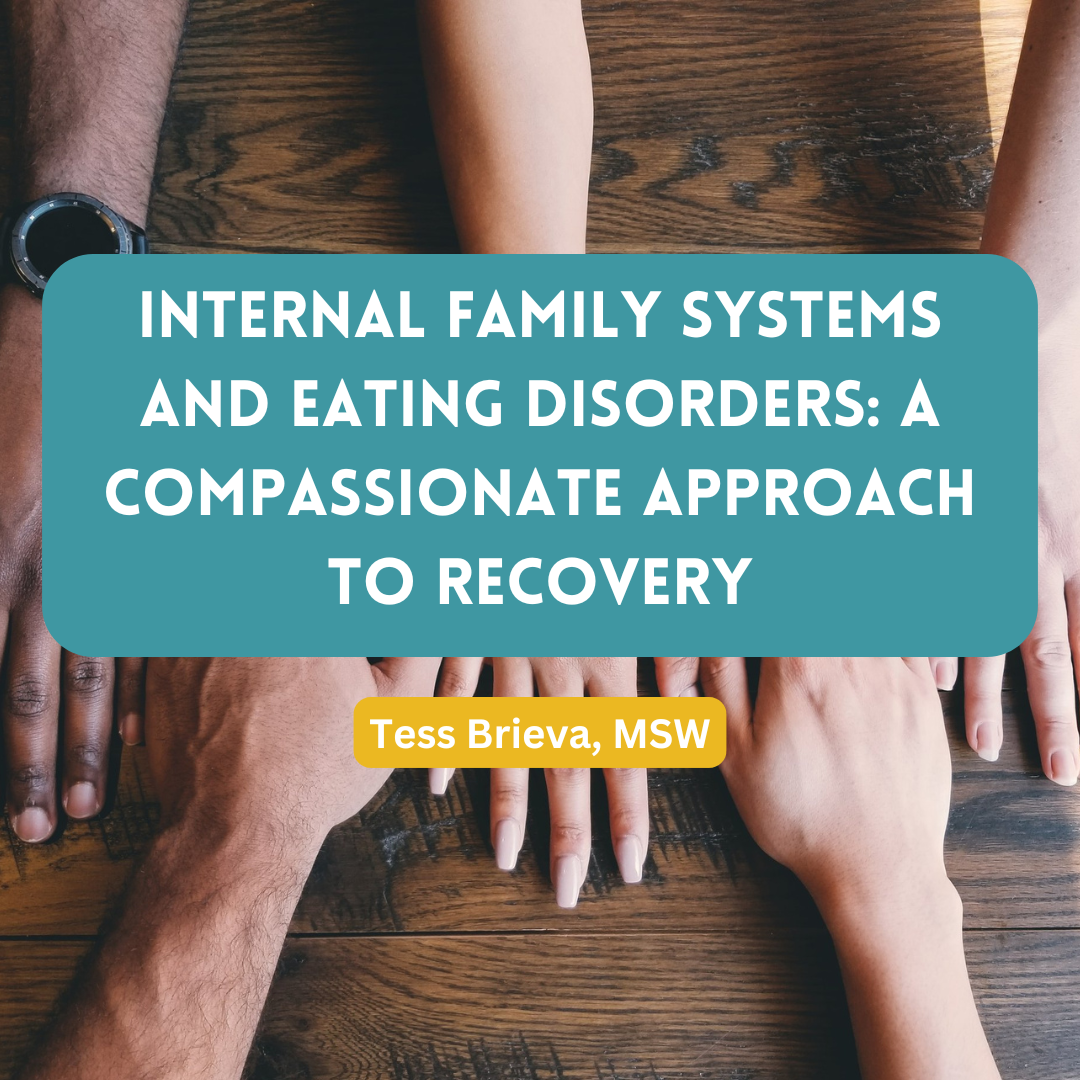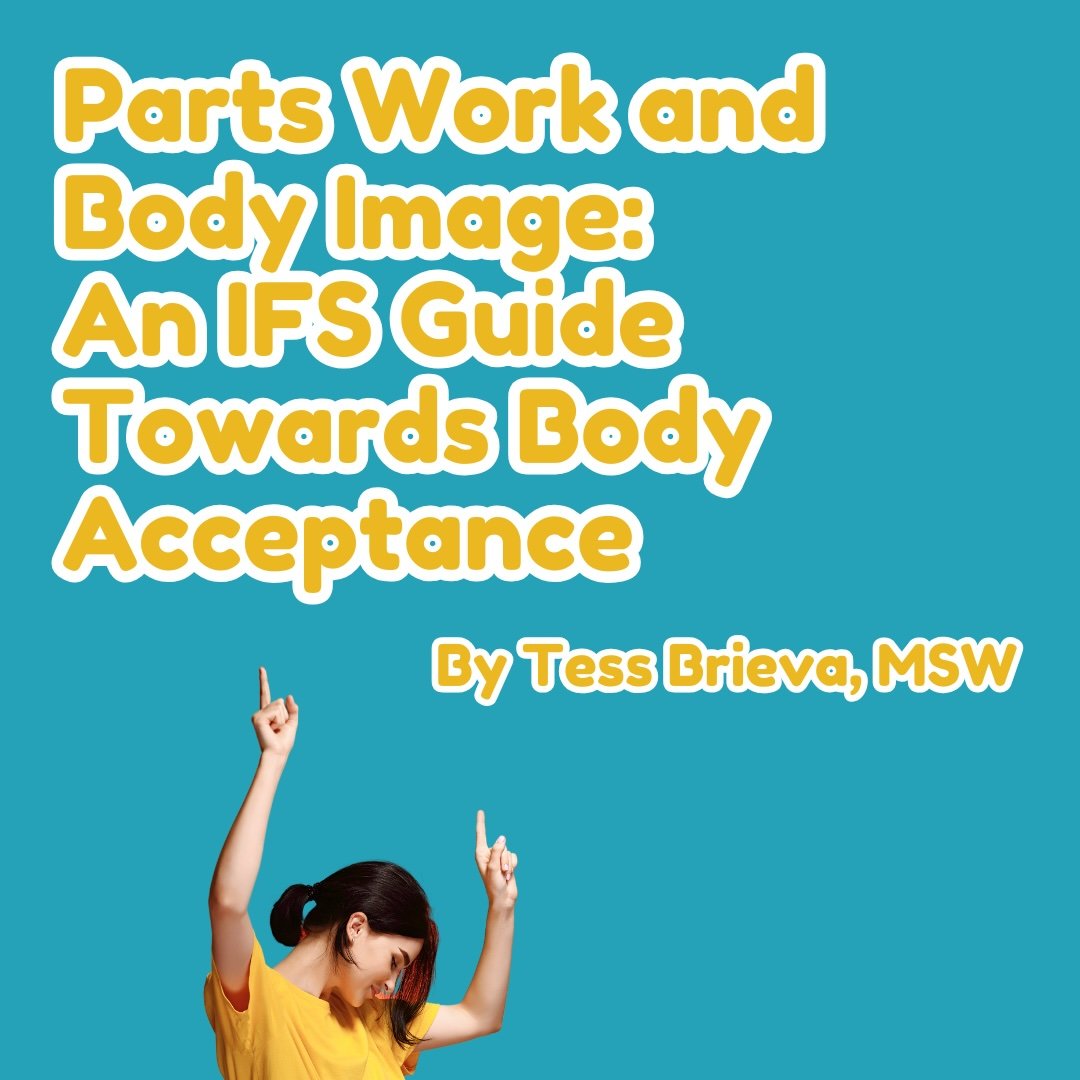Internal Family Systems and Eating Disorders: A Compassionate Approach to Recovery
By Tess Brieva, MSW
Living with an eating disorder can feel like navigating a relentless storm, where each day brings its own set of hurdles. It’s not just about food; it’s also about the emotional turmoil that accompanies this experience. You might feel isolated, ashamed, misunderstood, and overwhelmed by conflicting thoughts and feelings. If you are coping with an eating disorder or disordered eating patterns, know that you are not alone in this struggle.
Eating disorders are often complex, with roots in emotional, psychological, societal, and relational challenges. Traditional approaches often focus on behavior change, but Internal Family Systems (IFS) offers a different perspective — one that invites us to explore the internal dynamics behind those behaviors with compassion and curiosity. This introductory post explores how IFS looks at eating disorders and how recovery is possible through self-compassion, rooted in concepts established by IFS founders and Amy Yandel Grabowski’s book An Internal Family Systems Guide to Recovery from Eating Disorders: Healing Part by Part.
Eating Disorders vs. Disordered Eating
Eating disorders and disordered eating are often used interchangeably, but they represent distinct concepts. Eating disorders, such as anorexia nervosa, bulimia nervosa, and binge eating disorder, are clinically recognized conditions that meet specific diagnostic criteria. These disorders can have severe physical and psychological consequences and often require professional treatment. On the other hand, disordered eating refers to a broader range of problematic eating behaviors and internal experiences that may not meet the full criteria for a clinical diagnosis but can still impact one’s well-being. This might include chronic dieting, restrictive eating patterns, or emotional eating. While disordered eating can be a precursor to an eating disorder, it’s essential to acknowledge that both warrant attention and care, as they can significantly affect your relationship with food and body image. This blog post aims to address both eating disorders and disordered eating.
How Does IFS View Eating Disorders?
IFS views the mind as a system made up of different “parts,” each with its own voice, intention, and role. When it comes to eating disorders, IFS helps individuals understand that disordered eating behaviors are not the problem themselves but rather attempts by protective parts to manage deeper emotional pain.
As a disclaimer, sometimes IFS can be falsely utilized to justify harmful behaviors and frameworks. To be clear, when we describe parts as protective or certain behaviors as an attempt to protect, we do not necessarily condone or support this behavior. Rather, we strive to understand the deeper psychological process beneath extreme thoughts and behaviors, to build compassion, and seek balance.
Eating Disorders as Attempts to Protect
Rather than viewing eating disorders as purely harmful behaviors, IFS invites us to see them as adaptive coping strategies — although ones that ultimately cause harm. A binge-eating part might believe it’s helping by offering temporary comfort from emotional pain, while a restrictive eating part may believe it’s creating safety through control. These parts often carry extreme roles because they feel they are the only way to survive. Understanding these parts' good intentions, even when their methods are destructive, is central to the healing process.
One of the core principles of IFS is that all parts are welcome. Instead of trying to eliminate disordered behaviors through willpower alone (which is a myth), IFS practitioners help clients form compassionate relationships with their parts. The goal is to understand what these parts are trying to protect, what fears they carry, and what they need to feel safe enough to release their extreme roles.
Understanding Parts: Protectors and Exiles
In IFS, parts are aspects of ourselves that take on specific roles to help us navigate life’s challenges. When someone develops an eating disorder, certain parts may engage in controlling behaviors—such as restrictive eating, binging, or purging—to protect the person from overwhelming emotions or perceived threats. These are known as protective parts, which work hard to shield the individual from deeper wounds, often referred to as exiles. Exiles represent vulnerable parts that carry burdens like shame, loneliness, or fear—feelings that may have been pushed aside due to trauma, rejection, or unmet emotional needs. For example, someone with an eating disorder might have an exiled part carrying a deep sense of unworthiness, and a protective part that believes controlling food or weight will prevent that pain from surfacing.
Below is a diagram demonstrating how IFS conceptualizes eating disorders, illustrating what happens when protector parts are in extreme roles.
Protective Parts: Managers
Managers are proactive protectors, trying to do what they can to prevent negative experiences. Here are some examples of how IFS understands the operation of managers in relation to eating disorders:
Control and Perfectionism: The manager may strive for control over eating habits and body image, often setting strict rules or unrealistic standards. This part believes that maintaining control will prevent feelings of shame, anxiety, or vulnerability. It deeply fears losing control.
Avoidance of Painful Emotions: The manager often tries to suppress or avoid emotions related to past trauma, rejection, or low self-worth. By focusing on food and body management, this part seeks to protect you from deeper emotional pain.
Self-Criticism and Judgment: This part may engage in harsh self-talk, promoting a critical inner voice that reinforces negative beliefs about yourself. It often believes that being overly critical will motivate you to achieve better results or maintain a certain appearance.
Hyper-responsibility: Managers may take on an excessive sense of responsibility for your well-being and the well-being of others. This can lead to prioritizing others' needs over your own, using food and body management as a means to cope with stress and pressure.
Protective Parts: Firefighters
Firefighters are reactive protectors, attempting to reduce activation, pain, or overwhelm in any way possible. Here are some examples of how IFS understands the operation of firefighters in relation to eating disorders:
Binge Eating as a Coping Mechanism: Firefighters might resort to binge eating as a way to quickly numb intense emotions or stress. This behavior provides temporary relief from feelings of anxiety, sadness, or loneliness, serving as a distraction from deeper issues. Binge eating can also be utilized as a type of self harm.
Emotional Eating: Not necessarily as extreme as binge eating, emotional eating is a coping response to overwhelming emotions, as firefighters use it as a strategy to soothe discomfort. This can involve eating to fill a void or to escape feelings, reinforcing a cycle that complicates the relationship with food.
Purging: In response to feelings of guilt or shame after a binge, firefighters might push for purging, believing this will alleviate the discomfort.
Numbing Behaviors: Firefighters may engage in other numbing behaviors, such as substance use or compulsive exercising, to avoid confronting painful feelings. These actions are often driven by a desire to escape rather than process what’s truly happening internally.
In eating disorders, managers and firefighters are usually polarized, creating inner conflict and a sense of confusion, turmoil, or stagnation. Protector parts in these extreme roles often lead to yo-yo dieting, restrict-binge cycles, and other unstable patterns.
Healing Through Self-Leadership
In IFS, healing happens through the emergence of the Self—a core, compassionate presence that every person has within them. The Self is calm, curious, and capable of leading the internal system toward balance. When individuals connect with their Self, they can engage with their protective parts from a place of understanding rather than judgment or shame.
Through the IFS process, individuals learn to listen to their parts, address and release the burdens carried by exiled parts, and guide their protective parts toward healthier roles. For example, a part that restricts food might need reassurance that safety can be found in other ways, while an exiled part carrying shame might need validation and compassion to release its burdens. As parts begin to trust the Self, the rigid need for disordered eating behaviors diminishes, making space for healing and self-acceptance. IFS believes inner wisdom and balance can occur spontaneously once the system is relieved of heavy burdens.
Below is a diagram demonstrating how an exile, when unburdened, can welcome positive qualities and reassure protectors to find a balanced role.
Importantly, unburdening is a complicated psychological process that often requires the presence of a trained professional or trusted community leader to prevent retraumatization. If you think you might benefit from IFS therapy to address eating patterns, consider working with a therapist at Balanced Awakening.
Conclusion
Internal Family Systems offers a powerful framework for understanding eating disorders by shifting the focus from control and behavior management to inner connection and compassion. Rather than seeing disordered eating as the enemy, IFS encourages individuals to explore the underlying intentions of their parts and uncover the deeper wounds driving those behaviors. Healing becomes possible when all parts are welcomed, listened to, and guided by the Self toward new ways of being. With time, individuals can move from a place of inner conflict to one of harmony, leading to a more peaceful and nourishing relationship with food, their bodies, and themselves.
Want a deeper dive into IFS for body image?
This 14 page workbook provides a compassionate approach to healing body image struggles using Internal Family Systems (IFS) therapy. Instead of focusing solely on behavior change, IFS helps you explore the deeper emotional dynamics behind negative body image with curiosity and self-compassion.
By recognizing that your mind consists of different "parts"—Managers, Firefighters, and Exiles—this workbook guides you to understand how these parts attempt to protect you from emotional pain. It introduces the concept of Self Energy, a healing force within you characterized by the 8 Cs: Compassion, Curiosity, Connectedness, Creativity, Calm, Confidence, Courage, and Clarity.
Through targeted exercises, you will identify how these parts operate in your own experience, build self-awareness, and develop a more accepting and loving relationship with your body. By the end, you’ll feel more patient, compassionate, and better equipped to embrace yourself as you are.








